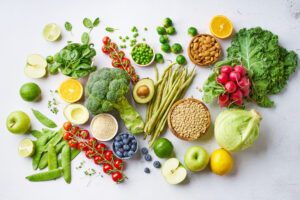
Dr Luke Wilson


If you want to get your gut in order, Dr Will Bulsiewicz is the expert to help you sort out fact from fiction. This is the gut-health cheat sheet...
In the fast-paced and demanding world we live in, finding moments of stillness and calm can be challenging. In an attempt to find a little peace...
Creamy beans with a hint of lemon are the perfect base for delicious, garlicky mushrooms.
Using kale leaves for wraps is an easy and delicious way to add more greens to your day. This recipe is super quick, satisfying, and flavoursome.
Gravlax is borrowed from the Nordic countries that commonly use salmon for the dish, but instead we‘ve used papaya as its base, coupled with...
Made with fermented whole soybeans, tempeh is packed with protein, prebiotic fibre and isoflavones known to have metabolic and hormonal benefits....
Simple, crisp, and tasty, these vegan florentines make the perfect sweet treat.
Sneak some healthy biotics into your family’s diet with these fritters, packed with probiotics from sauerkraut and yoghurt and prebiotics from...
Creamy, fresh and punchy, this avocado pasta sauce is loaded with vibrant greens and healthy fats.
Spraying sheets and pillows with calming scents can be a wonderful aid to slumber
The next time you go for a walk, discover the wonder of the everyday world around you
A skincare routine can be a way to nourish yourself inside and out
When the clouds converge, practise gratitude for the smallest of glimmers, and learn to dance in the rain.
Changing your diet can present the odd challenge as your body adjusts to different foods. Let’s look closer at some common concerns and how to overcome them.
I’ve been helping people adopt a fully plant-based lifestyle for about a decade, and every year, more and more people from all walks of life are becoming enthusiastic about making this transition. Whether you’ve made this choice for health, environmental, or ethical reasons (or a combination of all three!), it’s undeniable that going plant-based can throw up the odd hurdle. Let’s better understand some of the most common issues people face, so you can help yourself (or someone you know) stay the course of this positive change.
Plant foods like fruits and (especially) vegetables are less energy dense (lower in calories) than animal products, so we can run into problems if we simply substitute one for the other. Feeling lethargic and low in energy when following a plant-based diet, believe it or not, is almost always because we are simply not eating enough!
Often, this happens when plant-based eaters make well-intentioned efforts to avoid eating too many carbs, but complex carbs are the body’s best source of fuel. Starchy vegetables, whole grains, and beans and legumes contain four, five, and six times more energy respectively than other vegetables and up to twice as much energy as fruit. So, it’s little wonder that our ancestors relied on (minimally processed) staple crops like rice, potatoes, oats, corn, and wheat to provide most of their energy. If you’re feeling low on energy, the best place to start is simply eating more food, emphasising these more concentrated sources of healthy carbohydrates.
Protein is the most overhyped nutrient ever. Because it’s a term often (erroneously) used interchangeably for ‘meat’, our protein intake can become a hot topic of conversation or receive misplaced concern when we reveal we only eat plants. Protein is found in all whole foods and our daily protein requirements are tiny: about 10 percent of our total daily energy intake is optimal for most. If this sounds low, consider that our bodies grow the most and the fastest when we are babies – and the perfect food to fuel that growth is breastmilk, with a whopping 7 percent of energy from protein!
Because almost all plant-based foods provide over 10 percent of energy from protein (except fruit, which is generally about half this), if you are meeting your energy needs from plant-based foods, you are almost certainly getting all the protein you need from it too.
While athletes or people who are very physically active may wish to look more closely at their protein intake, most people can simply forget about it. We have an inbuilt drive to eat more when we exercise more (which is why exercise alone isn’t particularly effective if your goal is weight loss) and when we eat more whole, plant-based foods, we automatically get more protein. Problem solved!
In contrast to protein, fibre is likely the most underrated component of our food, and we should be paying more attention to it. Fibre is essential for staving off gut-related disease, but most people who follow the standard Western diet don’t manage to consume the minimum recommended amount. In contrast, the average plant-based eating pattern easily meets or exceeds our fibre requirements.
However, the reason that fibre is so important for our health is also the reason it can give us trouble, especially when we first switch to eating more plants. When we change to plant-based eating, our gut bacteria suddenly get all the fibre they’ve ever dreamed of. Over time they get used to this, and you’re left with the healthy and happy gut that has been associated with lower risk of everything from heart disease to depression, with better immunity into the bargain. But sometimes the transition can be a little rough, with symptoms like bloating, abdominal pain, and increased gas possible as your microbiome adapts.
For almost everyone these symptoms ease over time and eventually disappear completely. But if you’ve had issues with gut symptoms in the past, you may want to ease your microbiome into things gradually. Initially limiting foods that are especially high in fibre, such as beans and whole grains, can make a huge difference. You can increase your intake as your gut microbiome adjusts to the increased fibre. If you’re really struggling, you might like to check out The Gut Health Revolution Course online with plant-based gastroenterologist Dr Alan Desmond. Or for a comprehensive book about plant-based gut health, do your microbiome a favour and get a copy of Fibre Fuelled by gastroenterologist Dr Will Bulsiewicz.

Image: Asya Nurullina on Shutterstock
More commonly, I hear from patients that their hair, skin, or nails seem much healthier since going plant-based. As a doctor I can confirm that a healthy, plant-based eating pattern (along with a B12 supplement and regular, safe sun exposure or a vitamin D supplement) provides absolutely everything your body needs to maintain hair, skin, and nails in optimal condition.
So why do some people report hair loss when they switch? The usual culprit is a medical condition called telogen effluvium, which may sound like an incantation from Harry Potter but is not usually serious. Telogen effluvium is generally triggered by a disturbance to the hair cycle, which itself results from a ‘triggering event’. These events include prolonged periods of stress, hormonal changes, and nutrient deficiencies.
Looking back to ‘I have no energy’, a switch to plant-based eating can cause a sudden and significant decrease in energy intake and/or associated weight loss if you aren’t meeting your calorie needs. It’s this that can in turn trigger hair loss in some people. Again, as with addressing your energy needs, simply increasing the number of starchy vegetables, whole grains, and beans and legumes you’re eating will prevent this issue or resolve it in almost all circumstances. These latter two food groups along with green leafy vegetables are also great plant-based sources of zinc and iron that you could consider increasing if you do notice hair loss. Do keep in mind that because the hair cycle is literally years long, it can take time to notice improvements even once you’re doing all the right things. It’s also worth discussing your concerns with a GP that is plant-based friendly.
Before we even get started on this one, I’d like to point out that plant-based eating does not necessitate eating a lot of, or even any, soy products. I’m in favour of a minimally processed and varied approach to eating, so I probably consume soy once a week at most. Gone are the days when the only dairy and meat alternatives were soy-derived or some form of tofu. There’s no need to consume soy at all if you’re plant-based.
But what if we do eat soy regularly? We’ve all heard that soy contains a particularly high amount of phytoestrogens. These are plant substances that have a very similar structure to oestrogen from the body and can bind to oestrogen receptors. While this may sound concerning, the science is clear: there are numerous health benefits related to phytoestrogen consumption for both men and women, and no convincing evidence of any problems.
Men who are worried about the effect of eating plant-based on their hormone levels should be heartened by a recent article published in the World Journal of Urology that showed no association between the plant-based content of diet and serum testosterone levels. Further comfort can be taken from the less scientific but hilariously reassuring self-experiment of Brian Turner, a vegan bodybuilder who consumed about half a kilogram of soy daily for over a month and found his testosterone levels had, if anything, increased.
***
Even if you experience the odd hurdle as you make the transition, you can be confident that a plant-based diet comes with myriad health benefits and little to worry about. Based on my decade or so of personal and professional experience, following the science, conducting my own research, and helping hundreds of others to shift to plant-based eating, I am convinced that this is the healthiest dietary pattern for humans. Of course, just like any lifestyle change, a little bit of research and planning from the outset will make the transition a lot easier. A varied plant-based eating pattern that emphasises whole, unprocessed foods (and that mandatory B12 supplement!) is a fantastic long-term choice with proven power to add years to your life and life to your years.
Cover image: RF._.studio on Pexels
In the fast-paced and demanding world we live in, finding moments of stillness and calm can be challenging. In an attempt to find a little peace...
If you want to get your gut in order, Dr Will Bulsiewicz is the expert to help you sort out fact from fiction. This is the gut-health cheat sheet...
Spraying sheets and pillows with calming scents can be a wonderful aid to slumber
The next time you go for a walk, discover the wonder of the everyday world around you
A skincare routine can be a way to nourish yourself inside and out
When the clouds converge, practise gratitude for the smallest of glimmers, and learn to dance in the rain.